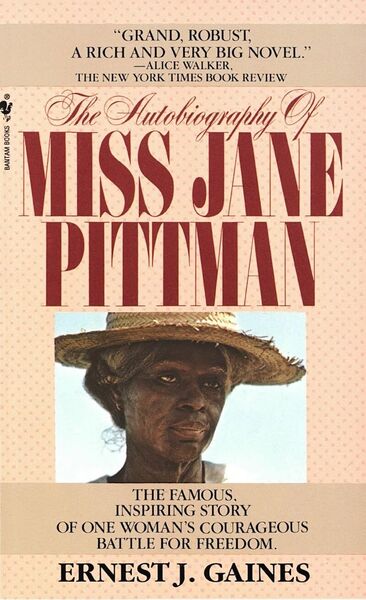Happy Days Are Here Again
The Autobiography of Miss Jane Pittman
By Ernest J. Gaines

21 Nov, 2020
Ernest J. Gaines’ 1971 The Autobiography of Miss Jane Pittman is a standalone historical novel.
The premise: an unnamed teacher interviews an ancient black woman, believing that she will provide a unique historical perspective.
Jane is a child slave still known as “Ticey” when the first hint of change to come arrives in the form of Union troops chasing slaver soldiers. A Union officer named Brown takes a passing interest in Jane. He renames her Jane and then leaves. Although she will never see him again, the encounter transforms her life.
A couple of years later, the slaver state falls. The white slave-owning class is forced to submit to the Emancipation Proclamation. Slaves like Jane are now free. Life will no doubt be wonderful.
Or not.
Jane utterly believes Brown meant his kind words. She is determined to join him in Ohio. Unfortunately for the eleven-year-old, not only does she have no idea where Ohio might be (aside from “north”), the former slaves she questions have no clear idea either. After days and weeks of walking she has failed to reach Louisiana’s border, let alone as far as Ohio.
Jane never manages to make it out of Louisiana. White patrols harass and murder migrating black people. Jane encounters Ned, an orphaned boy, on the road and makes herself responsible for him. If she’s to keep Ned fed and alive means she has to cease her quest; she settles down on what is for the moment a reasonably decent plantation.
Matters go well enough during Reconstruction. But Reconstruction ends and the North withdraws its troops, leaving Southern whites free to find new ways to enforce old social hierarchies and invent new ways to force black workers to supply labour at cut-rate prices. (In many cases this meant a drastic increase in incarceration; the 13th Amendment hadn’t foreseen that prison labour could be an effective replacement for slavery.)
Educated during Reconstruction, Ned works towards the betterment of his people. Since this is a threat to established economic and social power structures, he is marked for death. Eventually, he is killed, leaving others to carry on his work in the face of determined opposition.
This is a recurring theme in Jane’s life. While she is fated to survive long enough to be interviewed in the 1960s, this is not true of the people in her life. Such autonomy as they enjoy is bought at the cost of great personal risk. Some of those she outlives die of natural causes. Many do not. Whites are determined to preserve social structures founded in slavery.
The hundred-year-old Jane witnesses the tumultuous 1960s, when yet again black Americans struggle to gain the rights that their nation supposedly guarantees to all its citizens. Will this be more successful than previous efforts? Jane will ultimately never know.
~oOo~
There is something so white-savior about Brown deciding for Ticey that her name is unacceptable and providing her with a superior name of his choosing. I understand that in the television movie that followed almost immediately on the publication of the novel, “Jane” is merely one of a number of possible new names she could adopt. In the novel, however, Brown does all the choosing.
Constrained as it is by actual history, the novel isn’t going to offer the usual feel-good conclusion enjoyed by many readers. That’s not how history played out where American race-relations are concerned. Indeed, using this novel as a guide, one could make educated guesses as to how the US would adapt to such measures as Voting Rights Act of 1965: engage in every possible ploy to deny the vote to African Americans while biding its time until the VRA could be cast on the dust-pile of history.
The author skillfully paints a picture of the century after the First American Civil War; he gives us a protagonist about whom we cannot but care. The result is rather bleak, but it is admirably done. It’s like repeatedly smashing one’s thumb with a particularly finely crafted hammer. I can’t say that I enjoyed this book, but I didn’t regret reading it.
The Autobiography of Miss Jane Pittman is available here (Amazon US). here (Amazon Canada), here (Amazon UK), here (Barnes & Noble), here (Book Depository), and here (Chapters-Indigo).
